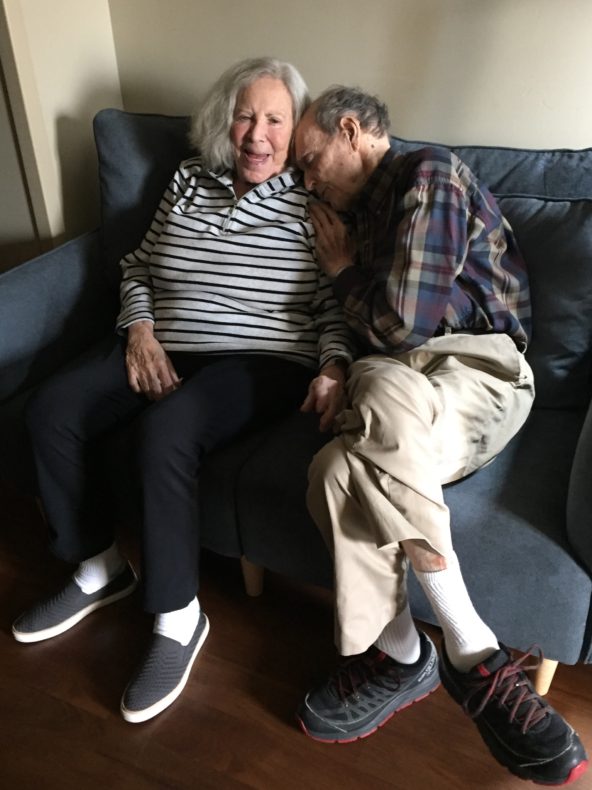
It is crushing to see my dad in the nursing home. Life is so small there, the food so terrible, the residents so…out of sorts. One woman continually calls for help—a tiny voice in some faraway room, ignored for crying wolf; one man walks the halls with glazed eyes and drool dripping down his chin. Another guy slumps in a wheel chair, hand working himself under a blanket. It’s a hard place to make friends.
My dad may be 90, but he doesn’t want to play Bingo or make collages and holiday cards with strangers. He was, still is in my mind, a world traveler and a man of words, an acer of puzzles, a writer of limericks and silly songs, a reciter of everything from Byron to Baez.
His options, though, are severely limited these days. I, for one, have to let go of my idea of him and let him be who he is now, as his long-time partner’s Alzheimer’s has become their shared affliction. I take comfort that, while his travels and grand intellectual pursuits are gone and her mind is like chipped paint, there is still music and there is still love.
Watching a parent’s world contract is like a dull ache in the gut. His days are now all about when she turns to him in confusion and finds relief, when he shuffles over to her bed to watch her sleep and she grabs his hand. When a song comes on that brings them together, that’s the thing. The simplest, most important thing.
Those musical moments truly do the most good. When old favorites come on—classics from musicals, folky stuff from the days when he played guitar and my brother and I sang–he still has a rich voice and an ear for harmony, and he’ll squint to the sky as he tries without apology to hit a too-high note. She, miraculously, finds the right lyrics most of the time, even as she forgets her granddaughter’s name and that she has a son.
Neurological studies tell us various pleasant activities can have positive effects on people with dementia, but music seems to have a special staying power in the brain. It pulls up both memories and emotions, even well after a person has lost the ability to say what she means, or even to talk at all. (Recently we visited one of Dad’s old friends, who can’t walk and says little and yet sat at the piano and played the old songs as well as ever, singing with heart if not strength.) Familiar music, scientists have shown, seems to bridge neighboring, misfiring regions of the brain, activating them all at once.
I imagine those networks lighting up when she sings; she seems to stare inward as if watching the lyrics run behind her eyes like a news crawl on a TV screen. She taps out the rhythm in her lap with her fist, a half beat behind. Her voice is gravely and childlike and off key–always has been–and they laugh as she lands on yet another sour note. And then they both lean toward the speaker to hear what’s coming up next.
“I can’t leave her,” he told me when this all started, her diagnosis confirmed, and I tried to convince him to move closer to me. “She would go to pieces.” I knew her decline would be swift and tragic, and that he would soon be alone even with her there. I told him that. He knew what was ahead.
But he stayed, and moved with her into this single room with a pair of hospital beds and a pair of TVs and nothing much to celebrate. And now, with his failing eyes, he’s watching her lose her way and trying mightily to guide her. Her needs decide their daily trajectory. If I take him out just for an hour for a breath of fresh air, she is distraught and hurt; when I hug or kiss him she is suspicious of my intentions. At times I have to press down hard on what might be anger–at her for needing him so much, at him for letting her.
If I’m honest, and I’m not proud of this, I’ll admit I selfishly wanted him to step away and be that dad I remember, still open to and growing in the world. Instead he sits with his head on her shoulder, humming, a kindness offered up as the clock winds down.
When we find a favorite tune, a switch is flipped and she is someone she used to be, laughing at herself, which makes him laugh, too, and gives him something like hope, at least for the length of the song. He’ll stand briefly to conduct, arms waving comically, until she feels lonely and reaches for him, tugging his arm so he’ll sit back down.
It means everything to her, having him right there at all times. And it seems, for him, for now, this is enough.
———
Photo by the author
just ………just a wonderful but sorrow-filled set of words to describe a human sunset
My sister (I think you know her) wrote a book called After the Death of a Child. I have reread it a number of times, although, like this post it describes events we would rather not know about. But it is a powerful recounting of the power of love. This post reminds me of that.
Thank you, Gail. I’m impressed that you read that book more than once; in your shoes I wouldn’t have. You’re generous.